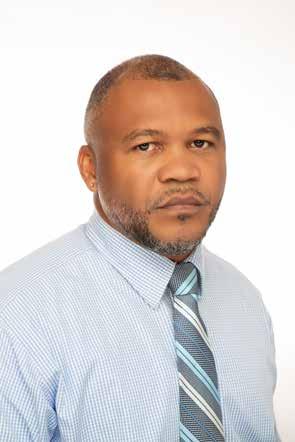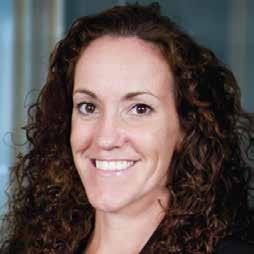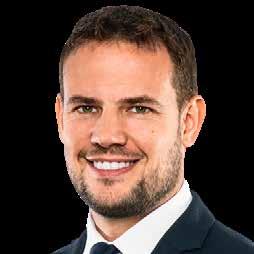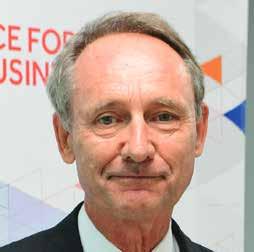
8 minute read
BEYOND GLOBALIZATION: OPPORTUNITYIES AND CHALLENGES FOR THE BVI
Over the last 30 years, the British Virgin Islands (BVI) has been a vital cog in the global economy, enabling the international business and finance landscape and facilitating investment, However, it is now clear the economic environment the BVI has been operating in for the past three decades is changing.
From climate change to the rise of digital assets, governments and businesses are being required to adapt and prepare for a markedly different future. These changes will present challenges and opportunities for the BVI. The extent to which the BVI can benefit from these winds of change and remain competitive will now rely on the agility to remain both proactive and reactive in the fast-shifting landscape. To explore these challenges and opportunities, BVI Finance invited leading BVI professionals from across the financial services industry to discuss the role of the BVI in the shifting global economy and explore how we can future-proof our position as an innovative and competitive jurisdiction.
The global economy is shifting. How optimistic are you about BVI’s future role in this new economic landscape?
Lorna: I am optimistic because the BVI has proven its resilience, both post-covid and post- hurricane. The BVI continues to punch above its weight; as a country of 30,000, we contribute to the employment of 2.3 million people across the globe. That is very significant.
Elizabeth: The BVI has demonstrated time
and time again over the last 30 years that it is resilient, and that we have the experts, the professionals, and landscape to make it work. The energy and enthusiasm we have seen from the BVI is not going to go away but we must always remain mindful and alert. We cannot change what happens on a geopolitical level but we can adapt and embrace new opportunities.
George: As Elizabeth just said, we have a lot of energy, enthusiasm, and a phenomenally talented financial services industry, which is why we have always succeeded in challenges so far. Moving forward, we must remain proactive and consider how we can improve our framework outside of responding to external events and pressures.
Jeroen: The world has changed very quickly and the only thing you can do is prepare, train yourself and your team, and ensure you have the right legislative environment in place. We also need to be able to pick up anything new that comes down the line, such as digital assets, which we are in a very good position to do.
The potential of digital assets and crypto
Ayana: There is an interesting opportunity for the BVI in the digital assets space, but it will depend on several factors. Crucially, it will depend on the level of understanding on what the crypto space means - not just amongst regulators but also the people working within it. You need expertise on both sides of the fence who can manage the risks in this industry. On
one side, you need governance, risk, and compliance to monitor the transactions, and on the other side, you need the regulators to be able to supervise and other competent authorities to investigate when suspicions are reported. We need this holistic approach. There is going to be new upcoming legislation, but it is not going to fill all necessary gaps immediately. Only once we start to implement and use it, then we will gain a deeper understanding of best practices and how we can better evolve. We should not be wary of this space; we need to embrace it and are well positioned to do so.
Jeroen: We must be careful in this space and ensure that we avoid a situation like the Bahamas had with FTX. There is great scope for the BVI to benefit from digital assets and crypto, but we need to be careful not to move too quickly.
Lorna: It is important for us to better understand what digital assets are and how they can be used. The sector has been met with increased caution since the collapse of FTX but I am confident that we can learn from it and make positive changes.
I think digital assets are a wonderful opportunity for our young people. It is a huge opportunity for them to get them involved in the financial services industry and we must do more to ensure BVI’s young people are more attuned to the opportunities in the sector. We have a very vibrant digital assets group here in the BVI and we need to focus on how we can drive progress in this sector.
George : I think ultimately FTX demonstrate that need for increased regulation in the sector. The fact that some businesses fail doesn’t necessarily mean that the technology will not change the world - it just means we haven’t yet quite worked out how best to do it.
Attracting talent in the digital age
George: The rise of remote and hybrid working is an interesting development and I think the digital nomad trend is particularly exciting for the BVI. There is a lot of interest in it, and we need to move from the idea to execution to provide people will clarity on the issue.
Moving to the BVI eight years ago was the best decision I ever made, and we will see increased interest in relocation to the BVI
if we reduce the bureaucracy around it. At a time when people are less likely to travel for business, we must make it as easy as possible for people to come to the BVI for work, whether on a short-term or long-term basis. This will also benefit our wider local community, such as restaurants and hotels, who have missed out on business tourism by the decline of in-person meetings since the pandemic.
Green Finance and Sustainability
Elizabeth: ESG considerations will become more important in the next 5-10 years and there are so many reasons why the BVI must get on board and take a leadership role. In terms of the financial case for ESG, those seeking short term profits will not have a big interest in ESG, but those looking at long-term investments will understand the significance. Larry Fink, for example, has asserted how he is looking at pensions 30 years in advance and has acknowledged that at some point in the near future, you will not be able to operate in certain government spheres or do certain transactions unless you follow ESG principles.
Some people might still view green finance and ESG as a tick box, but for investors, employees, and customers, it is increasingly a priority, so we need to take it seriously. It is a key focus for the next generation; for example, when we interview new recruits, they ask about our ESG credentials and want to know if we are aligned to their values.
Future-proofing the BVI Business Company
Ayana: The BVI Business Company is naturally our core; it is our foundation and what we have developed our reputation on over the years. The private sector has done an excellent job at understanding what our clients want and facilitating that. In order to ensure our continued success, the private sector, government, and other stakeholders must come together to create a joint vision for the financial services sector and the future of the BVI Business Company.
George: Our product is a fantastic one and we have one of the best corporate laws in the world. However, the last time we made any serious amendments because of shifting client demands was in 2016, and every round of amendments since then has been due to pressures from external events. We all know why that has occurred, but moving forward, it will be a priority for us to be more proactive and create positive changes that make our client’s lives easier. We need to find the space to do this, instead of always being reactive.
Elizabeth: We have excellent product and excellent people. I do think the BVI is shifting from mass incorporations to that highvalue model and that is not something we need to shy away from. The knock-on effect for high value clients is enormous and we cannot be afraid to evolve in that way.
Jeroen: We must be proactive and be prepared for anything that might happen - it is crucially important to understand what future needs might be. We can look to other jurisdictions for learnings, but I do not think we should try to copy other jurisdictions. We need to find our own sweet spot based on our own strengths.
MODERATOR

Brodrick Penn Deputy Managing Director of Operations, BVI Financial Services Commission
PANELISTS

Elizabeth Killeen Partner, Carey Olsen

George Weston Partner, Harneys

Lorna Smith O.B.E., M.A. TEP
Deputy Premier and Minister of Financial Services, Labour and Trade

Ayana Glasgow
Director of International Business Regulations, Ministry of Financial Services, Labour and Trade

Jeroen Hoogendijk
Then Managing Director, TMF










